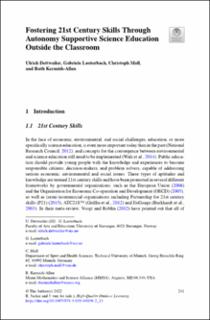| dc.contributor.author | Dettweiler, Ulrich | |
| dc.contributor.author | Lauterbach, Gabriele | |
| dc.contributor.author | Mall, Christoph | |
| dc.contributor.author | Kermish-Allen, Ruth | |
| dc.date.accessioned | 2022-08-10T08:40:33Z | |
| dc.date.available | 2022-08-10T08:40:33Z | |
| dc.date.created | 2022-08-07T08:08:43Z | |
| dc.date.issued | 2022 | |
| dc.identifier.citation | Dettweiler, U., Lauterbach, G., Mall, C., Kermish-Allen, R. (2022). Fostering 21st Century Skills Through Autonomy Supportive Science Education Outside the Classroom. In: Jucker, R., von Au, J. (eds) High-Quality Outdoor Learning. Springer, Cham. | en_US |
| dc.identifier.isbn | 978-3-031-04107-5 | |
| dc.identifier.uri | https://hdl.handle.net/11250/3011025 | |
| dc.description.abstract | The development of 21st century skills in or rather through science teaching is on the agenda of many national and international school reforms aiming at creating so-called 21st century classrooms. In this context autonomous learning and practical relevance of science classes have been identified as important features, and education outside the classroom (EOtC) has been described as one way of providing such enriched classroom settings. We explore the relative importance of the four basic psychological needs (BPN), “perceived autonomy support”, “perceived competence support”, “student-teacher relatedness” and “student-student relatedness”, for the perceived practical relevance of the content (PRC) in science class in secondary school. We applied the same measures in normal and EOtC science classes, both in a short-term cross-sectional within-subject design study (A) and in a longitudinal between-subject design study (B). In order to account for the theoretical and empirical non-independence of the four BPN-explanatory variables, we used Bayesian ridge regression techniques. Our findings suggest that PRC in EOtC contexts is perceived higher than in normal classroom settings, both in the short-term as well as in the long-term designs. This can be best explained by the degree of perceived autonomy support by the students. In the short-term design, this holds true for both, the normal and the EOtC teaching contexts. In the long-term design, the relative importance of autonomy support can only be deemed statistically credible in the EOtC context. Perceived competence support and relatedness have no relative importance in the EOtC context. This suggests that science classes outside the classroom are less contingent on teacher-reliant or peer-related basic needs satisfaction. Thus, we can conclude that science teaching in EOtC fosters 21st century skills through more flexible, autonomous and collaborative settings and by being less teacher-centred. | en_US |
| dc.language.iso | eng | en_US |
| dc.publisher | Springer Nature Switzerland AG | en_US |
| dc.relation.ispartof | High-Quality Outdoor Learning. Evidence-based Education Outside the Classroom for Children, Teachers and Society | |
| dc.rights | Navngivelse 4.0 Internasjonal | * |
| dc.rights.uri | http://creativecommons.org/licenses/by/4.0/deed.no | * |
| dc.subject | utdanningsvitenskap | en_US |
| dc.title | Fostering 21st Century Skills Through Autonomy Supportive Science Education Outside the Classroom | en_US |
| dc.type | Chapter | en_US |
| dc.description.version | publishedVersion | en_US |
| dc.rights.holder | © 2022 The Author(s) | en_US |
| dc.subject.nsi | VDP::Samfunnsvitenskap: 200::Pedagogiske fag: 280::Fagdidaktikk: 283 | en_US |
| dc.source.pagenumber | 231-253 | en_US |
| dc.identifier.doi | 10.1007/978-3-031-04108-2_13 | |
| dc.identifier.cristin | 2041467 | |
| cristin.ispublished | true | |
| cristin.fulltext | original | |
| cristin.qualitycode | 1 | |

